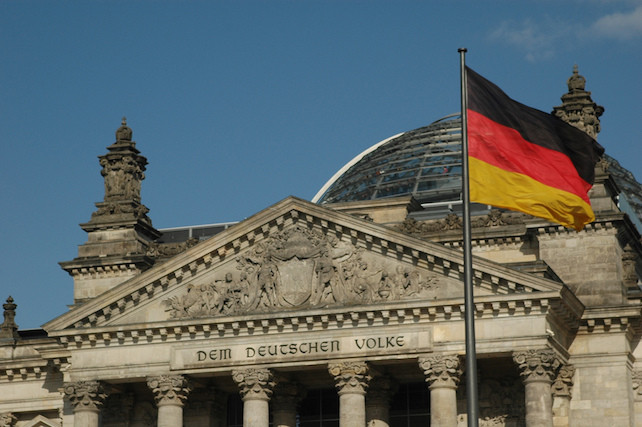The European council on foreign relations (ECFR) has conducted a comparative study on the party election manifestoes on positions towards the EU.
Four main policy areas— financial and trade policy, common security and defence, migration—were highlighted.
All the established political parties (the Christian democrat CDU, the social democrat SPD, the liberal FDP, the Greens and the Left Party) have a broadly pro-European stance, but they also emphasise reform. The new Eurosceptic, populist anti-immigrant AfD party calls for a return to the sovereignty of nation states and mulls over Germany leaving the EU by referendum.
Christel Zunneberg, author of the study, found that
“The SPD, Die Grünen, Die Linke and the FDP all call for further European integration based on the principle of subsidiarity, and want to strengthen European democracy. To this end, SPD, Die Grünen and the FDP all explicitly approve of a Europe of different speeds. Merkel’s CDU sets itself apart: it does not explicitly endorse flexible integration, nor demand institutional reforms to strengthen the European Parliament. Rather, it contends that European integration can be accelerated by kickstarting the Franco-German motor, using the momentum created by the Pulse of Europe movement, and by reviving the long-neglected Weimar Triangle.”
Financial and Trade Policy
The parties propose a wide variety of concrete reforms to regulate financial markets and stabilise the Eurozone after the crisis.
The CDU aims at instrumentalising the Franco-German power couple "Merkron" to create a European Monetary Fund (EMF), and to harmonise corporate taxation with France. Merkel’s party also wants to create a big new common project in artificial intelligence.
The SPD reform package is far more ambitious, according to Zunneberg. In addition to an EMF, it proposes an economic government for the Eurozone and a common finance budget, with the desire to deepen the European monetary union and develop the stability and growth pact further, while allowing for more freedom to conduct long term investments. The SPD also wants to tackle tax evasion of multinational companies.
Zunneberg found that the FDP's financial scheme is as extensive as the SPD's, but it does not equate financial security with European integration. On the contrary, it wants to adapt the treaties to allow countries to leave the Eurozone without leaving the EU, and to phase out the European Stability Mechanism.
The Greens are in favour of more regulation of the financial markets, through “simpler but tougher rules.” The party pushes for a debt ceiling for banks and stricter merger-controls.
The Left Party proposes a public European rating agency and a European debt conference to determine the legitimacy and sustainability of national debts.
The AfD considers the Euro to be a failed project, which has become too expensive for Germany. It wants the German government to start setting up gold reserves and prepare for a return to the Deutsch Mark.
On the future shape of EU trade policy, the parties seem to be even further apart, argued Zunneberg. The Left Party rejects free trade agreements such as CETA and TTIP, as does the AfD which prefers multilateral trade agreements and prioritizes the protection of German companies against uncertain legal relationships. The Greens, the SPD and FDP conditionally support such free trade agreements. The CDU supports the fulfilment of CETA and the continuation of TTIP negotiations.
Common security and defence policy
All the pro-European parties are in favour of integrating member states’ military forces. The SPD, FDP and CDU advocate the creation of a European Defence Union. Schulz, the lead candidate for the SPD, is more ambitious than Merkel, according to Zunneberg. He pushes for a European army. The SPD, the Greens and particularly the pacifist Left Party emphasise the civil dimension of CSDP. The Left Party rejects any militarisation of the EU.
Zunneberg found that attitudes towards Nato are ambivalent. The SPD, FDP and CDU emphasise the complementarity of European CSDP and Nato, but the Left Party favours Germany’s exit from Nato in favour of a collective security system that includes Russia. The AfD sees Nato as a pure defence union, but aims to strengthen European influence in the alliance.
The two percent guideline for defence spending set by Nato proves to be contentious as well. Those on the left of the political spectrum (the Left Party, the Greens and the SPD) reject increased military spending, while the FDP and the CDU pledge to increase defence expenditure to two percent of GDP by 2024.
Migration Policy
All the pro-European parties underline the shared responsibility of all member states for the accommodation of refugees. However, Zunneberg argued that they display varying degrees of satisfaction with the three pillars of the EU migration system.
Firstly, she found that all parties except the CDU call for a revision of the Dublin system to improve distribution amongst member states. The SPD goes furthest, envisioning a carrot-and-stick approach towards member states who refuse to take their share of refugees. The AfD is in favour of closing the borders and better return mechanism of rejected asylum seekers. It is against family reunification, double citizenship and argues that Islam does not belong in Germany.
Secondly, SPD, CDU and FDP are united in their aim to strengthen Frontex, the European border and coast guard agency. The FDP is clearest about what it should evolve into: a true European border force under the supervision of the European Parliament. On the other end of the political spectrum, the Left Party wants to abolish the agency altogether, and reinstate a coordinated sea rescue under EU auspices.
Thirdly, the EU-Turkey deal may cause friction in any new government coalition: whereas the Greens call the deal ‘problematic’ and the Left Party wants to undo it, the CDU aspires to close similar deals with other countries in North Africa. The SPD and FDP do not address the EU-Turkey deal in their manifestos.
This article was first published here and has been slightly amended.
